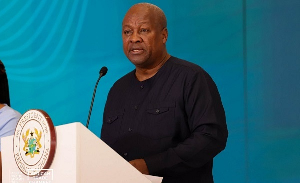By K. Badu
As a matter of fact, no serious political party will brush aside reported cases of vote rigging in our contemporary elections, considering the electoral fraudsters complicated and demonstrable infernal instruments for vote rigging.
The fact though, remains that electoral fraudsters will go to the length and breadth to ensure victory for their preferred candidate, especially, in our part of the world-developing countries (Ames 1995).
Thus, often, the incumbency, with the able connivance with the electoral officials, would roll up a fiendish and operable plan, which may include caging, spoiling, computerization, tossing, stuffing and rejecting.
As a matter of fact, electoral malpractices are rampant in both advanced and emerging democracies. However, if such obnoxious and ravenous practices failed to have any significant effect on the outcome of the elections, then it can be overlooked.
Having said that, it becomes very alarming if the said contemptible practices do turn out to be too costly to a particular party or candidate.
There is no denying of the fact that electoral cheats’ will do everything possible to devise a diabolical scheme to gain electoral advantage over their opponents. A typical example is when in 2013, a Councillor from Manchester in the United Kingdom disowned his daughter who was his opponent in local council elections due to electoral fraud.
His daughter, who represented the Labour Party, came victorious in the county council elections. However, her father who was the incumbent and the representative of the UK Independent Party uncovered electoral malpractices and reported the matter to the police.
Her father discovered that she had earlier registered four voters from another country in her home address.
In an attempt to exonerate themselves from the opprobrium, the leadership of the Labour party went ahead and dismissed the ignominious electoral fraudster.
The worst part of votes rigging, though, is the deserving winners’ may never know they ever won. How cruel, how pathetic and how unfair that would be?
In my opinion, vote rigging has perceptible likeness to the violation of allegiance towards the nation. Thus, such a high crime must not and cannot be overlooked with a stark perfunctory.
It is indeed unfortunate that the electorates would go to the polls with a view to voting for their preferred candidate, and only for the people behind the scenes to select who should become a winner.
And, if those people are not criminally minded, what are they then?
Take, for instance, it is being reported that hackers resorted to “computerization” in the just ended U.S general election with a view to favouring their preferred candidate.
“Computerization “is used in most democracies. “Computerization “is the process of using computerized "black box" voting machines. These machines are notoriously subject to sophisticated, vote-changing "hacking". In this instance, a great deal of damage is affected just by "glitches", where the machines simply fail to record votes. This is taken advantage of, in the simplest case, by placing the oldest and least reliable machines in the opposition party’s precincts or strongholds.
All the same, it would be strategically suicidal on the part of the opposition to sit idly and inure the shenanigans of an opponent who has an inborn inclination for influencing the outcome of elections.
Indeed, the ploys of the incumbency have to be uncovered and neutralised for the opposition to stand a chance. For it goes without saying that such vicious act is often effective in gaining electoral advantage in developing countries (Ames 1995).
As a matter of fact, an election body, in conjunction with the incumbent government, would execute their evil acts which may include purging, which is a clandestine act designed to alienate eligible voters from exercising their democratic rights.
Purging in partisan election is simply the unlawful ‘deletion or cleansing’ of suspected political opponents from the voters register by officials through computer databases that identify voter characteristics (tribe/ethnicity, residence location, etc.,--emphasis mine).
In other words, the databases would roll names of persons suspected to be sympathetic to the opposition party. And, often, the election officials would give flimsy and garrulous excuses for the removal of duly registered voters.
Regrettably, however, purging crudely takes away the democratic rights of some citizens. More importantly, this disgusting practice unjustifiably puts a particular political party at a substantial disadvantage in the elections.
What’s more, electoral officials could prevent or block eligible voters from registering or voting. Blocking registration, in its simplest form, is whereby the partisan election officials turn down registration applications, selectively, sometimes without informing the eligible voter. To save officials the trouble of doing even that, gratuitous directives are often put in place to prevent eligible voters from registering.
Take, for instance, in Florida in the 2000 U.S election, officials instituted registration rules which were so picky, with penalties so severe that groups carrying out registration drives, like the League of Women Voters, were pushed to the side-lines in that state.
There may also be some instances whereby some registered voters may be sent away when they show up to vote. The ejection occurs mainly when a registered voter fails to produce state-approved photo ID.
Anecdotally, in the December 2016 general elections in Ghana for example, a number of voters on the special voting register were allegedly prevented from exercising their democratic rights, amid flimsy excuses.
Indeed, if that was the case, then some registered voters were treated unfairly in the process and must not happen in the subsequent elections.
Moreover, prior to the 2016 general election, we witnessed how a number of students from tertiary institutions across the country were unnecessarily blocked from registering during the 2016 limited registration exercise by not providing adequate Biometric registration machines.
Clearly, such an unpardonable act does not promote the spirit of universal adult suffrage we are all craving for.
Amazingly, prior to the 2016 general election, there were reported cases of pre-ballot thumb printing by some candidates with a view to “stuffing” the ballot boxes. Stuffing boxes with phony ballots, and cheating with the counting behind the scenes, are the old-fashioned ways of rigging elections. Yet in contemporary elections, the evil act is still deployed by some fraudsters.
For, if that was not the case, how come election officials would issue for example, 150 ballots and ended up with 170 at the end of voting?
How do we subsume such irregularity? Is that ‘stuffing of ballots’ or ‘influx of foreign materials?
Either way, for me, such act is criminal and squeamish. Thus it is befuddling to many discerning Ghanaians that such abominable act should be given a nod of affirmation.
Take, for instance, in his 2013 election petition judgment, Justice Atuguba made some contestable observations including the definition of over-voting which was one of the claims brought up by the petitioners.
“The first is where the number of those who voted at a polling station exceeds the number of voters contained in the relevant polling station register.” “The second situation is where the number of ballots in the ballot book exceeds the number of ballot papers issued to the relevant polling station.”
“Pondering over these two categories closely, I would think that the second category of over voting is rather an instance of ballot-stuffing as testified by Johnson Asiedu-Nketia,” the presiding judge delineated in his 48-page opinion.
Yes, I acquiesce to the fact that ballot stuffing does exist, but the big question is: would such squeamish plot not amount to over voting, going by Asiedu Nketsia’s unconventional definition of over voting?
It will be recalled that Asiedu Nketsia infamously referred to over voting as “the influx of foreign materials in the ballot box”. How Bizarre?
And, is ballot stuffing not a criminal offence? To be quite honest, I will forever be in puzzled countenance with anyone who acknowledges ballot stuffing as a mere misdemeanour, considering the surreptitious approach by the suspects.
Apparently, Dr Afari-Gyan admitted under cross examination that over voting may also occur in the event of the votes in the ballot box exceeding the number of verified voters. This, for me, is a poignant definition of over voting. For as a matter of fact, it would be easier to fish out the phony votes or stuffed ballot papers (Apologies to Justice Atuguba).
In any case, I would like to believe that the 2012 election petition spawned enormous benefits, most notably, the eminent Supreme Court Judges pronouncement to the effect that elections are usually won at the polling stations and not in the court rooms.
Obviously, such pronouncement illuminated the opposition’s benightedness on the need to be more vigilant in the future elections.
Unsurprisingly, however, the NPP Party leadership became more vigilant before, during and after the 2016 general election.
We were told that NPP leadership hired a savvy I.T person, gave bespoke training to their numerous polling station agents and motivated them, which resulted in motivation to transfer on the election day.
We also hear that in the Volta Region, the leadership prevented non-Ghanaians from voting through their ‘Operation Eagle Eye.
Coincidentally, however, the Region registered a very low voter turnout and the NDC’s votes in the Volta Region reduced drastically compared to 2012 election.
Apparently, the trend continued in almost all the ten regions in Ghana. Thus, many observers are attributing the reason to voter apathy. But I, for one, would not buy such a wrench.
The fact of the matter is that the NPP leadership played their cards right on this occasion through well-executed strategy and vigilance.
Opinions of Wednesday, 21 December 2016
Columnist: Badu, K















